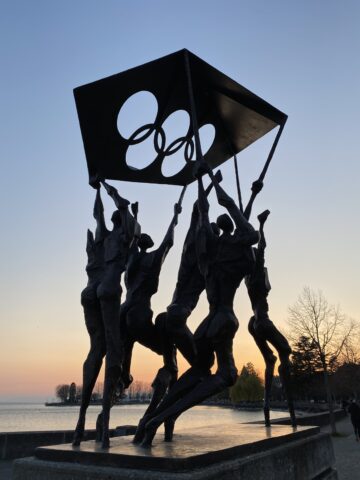Australian Football (“Essendon”) Doping Case / De novo review by the CAS – objection to the full power of review
SFT Judgment 4A_102/2016
A, B, C et al v. WADA, AFL & ASADA
The Issue in Essendon
Before the CAS: De novo review of a doping-related decision (“Essendon”) by the CAS Panel – violation of the anti-doping regulations
Before the SFT: Objections of the Essendon Players to the scope of review of the arbitral tribunal
The Facts in the Essendon CAS appeal
This Federal Tribunal judgment was the last step in a long series of proceedings over the widely known supplement program of the Australian Rules Football Club Essendon (the Club). The 34 players (the Appellants) were all professional players for the Essendon Club in the Australian Football League. The Club introduced a program of supplements for its players in September 2011, administering injections and allegedly using a prohibited substance. After ASADA’s initial investigations and the AFL proceedings against the Appellants, the AFL Anti-Doping Tribunal rendered a decision on March 31, 2015 finding that there was no evidence of a violation of the applicable Anti-Doping Regulations.
WADA subsequently filed an appeal to the Court of Arbitration for Sport (CAS), and the Panel was composed of the Hon. Michael J. Beloff QC, Romano Subiotto QC and the Hon. James Spigelman QC. AFL and ASADA were also allowed to participate in the proceedings. Pursuant to Art. R57 of the CAS Code, the CAS held that it would decide on the appeal de novo and would also take into account new evidence filed by all parties involved. The Panel ruled through a final award rendered on January 11, 2016, finding that the players were in violation of the relevant Anti-Doping Regulations imposing a two-year ineligibility period.
The appeal to the Swiss Federal Tribunal against the Essendon CAS Award
Existence and Scope of the Arbitration Agreement in the Essendon case: Full Power of Review (Art. R57) vs. Limited Review in Appeal
In the civil law appeal to the Federal Tribunal, the Appellants principally requested the annulment of the CAS Award for lack of jurisdiction. In essence, the Appellants alleged that due to the de novo assessment, the CAS Panel exceeded its jurisdiction (Art. 190 (2) (b) PILA) and, alternatively, it violated public policy (Art. 190 (2) (e) PILA). More specifically, at the relevant time, the 2010 version of the AFL Anti-Doping Code provided for a limited review in appeal (i.e., error in law, “unreasonableness” and manifest disproportionality). The full power of review came only after the 2015 version of the rules, which however was not applicable at the relevant time of the facts.
After reiterating the general principles applying to arbitration clauses under Swiss law, the Federal Tribunal proceeded to the interpretation of the “defective” arbitration clause in question according to the principle of good faith (i.e., the presumable will in the way it would and had to have been understood, in good faith, by the respective recipient of the declaration). Accordingly, once it is established that the parties wanted to exclude the dispute from state jurisdiction and submit it to arbitration, the principle of utility applies in order to give to the arbitration clause a meaning that would “save” the arbitration clause. The Federal Tribunal reiterated the fact that a jurisdictional defense must be raised before the submission to the merits (“Einlassung”) in accordance with the principle of good faith.

Initial jurisdictional Objections of the Essendon Players fail upon subsequent signing – without reservation – of the Order of Procedure
In the particular case, the Appellants initially raised their objections as to the de novo review of the Panel but did not subsequently question the power of review by the CAS after the latter decided to review the case de novo and hear new evidence (3.3). The Appellants even signed – without reservations – the Order of Procedure according to which the CAS Panel would decide the case in compliance with the CAS Code. They subsequently made full use of the de novo hearing, by submitting new pieces of evidence (including expert opinions) and insisted upon extensions concerning the backgrounds of certain laboratory tests, without making any reservation.
Relationship between Article R57 CAS Code (de novo) and the Regulations of the National Association
The Federal Tribunal also made an interesting comment with respect to the relationship between the CAS Procedural Rules and the specific regulations of the national association and noted that Article R57 of the Code (de novo review by the CAS Panel) did not foresee any reservation giving priority to the respective regulations of national associations. The Federal Tribunal concluded that the Appellants had lost their right to appeal and rejected the appeal.
As a side note, the Federal Tribunal also found that Article R57 of the CAS Code is a binding procedural provision, particularly in doping cases, it is used in order to ensure the observation of international standards within the worldwide fight against doping and a standard application of the relevant anti-doping regulations. Even if the view of the Appellants were to be retained with respect to the application of the national regulations (providing for narrowly defined grounds for appeal) notwithstanding the compulsory procedural rules of the CAS (providing for a full power of review), the arbitration agreement would still not be null and void per se but would be an agreement with “partially-impossible content” (BGE 138 III 29 at 2.3).
The Takeaway
Overall, this is an important judgment; it is interesting to note that the Appellants merely challenged the scope of the arbitration agreement — and not its existence. Another interesting point to retain is that – even if a party raises its objections with respect to jurisdiction at an early stage of the proceedings, its subsequent behavior and, particularly, the signing of the order of procedure without reservations will preclude such party from objecting to the jurisdiction / scope of review at the setting aside proceedings.
Note: the full judgment is available in French at the website of the Swiss Federal Tribunal www.bger.ch. The English translations of the international arbitration decisions rendered by the Swiss Federal Tribunal (from French, German and Italian) are available on the website www.swissarbitrationdecisions.com , operated jointly by Dr. Despina Mavromati and Dr. Charles Poncet as a service to the international arbitration community.





